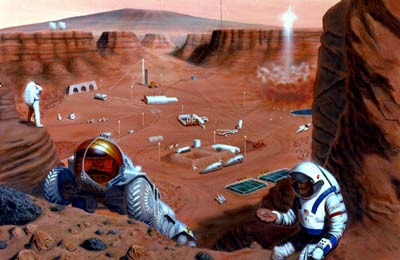A rationale for human spaceflightby Greg Anderson
|
| It is simply a fact that if humanity stays on Earth exclusively, the species will go extinct. |
NASA’s Mars rovers have been a remarkable success story. Designed to cover less than half a mile in 90 days, for example, Opportunity is still going strong after more than seven years and 30 kilometers. The fact is, though, that a human expedition could cover 30 kilometers on Mars—and do so more efficiently—in a day. Robots will become more capable, of course, but if we want to see wide-ranging, thorough explorations of Mars anytime soon, dedicated scientists who accept the dangers will have to go there.
The fact that NASA currently has to rely on Russia to get astronauts into space is surely a bizarre and stunning historical reversal, but it doesn’t mean the United States is no longer the United States. Nor does it mean that Russian, Chinese, or European space capabilities are the equal of American capabilities, though that gap is clearly narrowing. It might mean American political leaders over the past decade or so haven’t been as competent as the nation is strong, but that’s for others to debate.
It is simply a fact that if humanity stays on Earth exclusively, the species will go extinct. Yes, there is the possibility of evolving into one or more successor species, but for the near future, humanity will become a new species only if humans decide to do that. In that period, human civilization stands to face many problems that could lead to its collapse. To effectively deal with those problems will likely require more resources and capabilities than we have currently.
| Expansion of the human economy over this century will be key to the maintenance of a technological civilization. Human spaceflight is one tool we can use to allow people to see the possibility of a better future. |
Securing a resource base that extends beyond what’s available on Earth, and developing new technology, new wealth, and new ways to govern ourselves, should be the driving forces of human spaceflight. NASA’s human spaceflight program should be part of the bridge linking economic policy to technological development policy. We have already built ISS as an international project. Now, the challenge is to make breakthrough progress there in both pure science and in microgravity manufacturing. If it turns out that certain high value products can only be manufactured in space, a new industry will arise—and that new industry will likely require workers. Robots are not yet up to doing everything needed.
The next logical step for NASA in an economic/technology development context is to establish a human lunar base, perhaps as the lead agency in an international project. Some major nations have already expressed interests in that kind of effort. Such a base could conduct scientific research across a range of disciplines, begin to bring lunar resources into the human economy, and serve as a locus for future commercial development. Establishing a base would require a new level of international cooperation and the fleshing out of space law as it relates to property rights beyond Earth, establishing outposts, and more—all of which would pave the way for private enterprise and a further enlargement of the human economy. The same basic pattern could lead to the eventual opening up of Mars.
Expansion of the human economy over this century will be key to the maintenance of a technological civilization. Without the capabilities that only such a civilization affords, the immediate human future could turn unimaginably dark. Human spaceflight is one tool we can use to allow people to see the possibility of a better future, to expand our technological base, to develop additional resources by seeking cooperation and writing new law, and ultimately to see ourselves in a new way.
That’s why humans need to fly in space.
